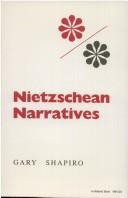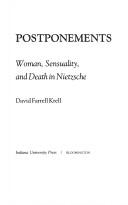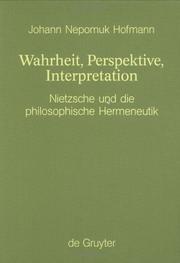| Listing 1 - 10 of 32 | << page >> |
Sort by
|
Book
ISBN: 1469656558 146965654X Year: 1985 Publisher: Chapel Hill : University of North Carolina Press,
Abstract | Keywords | Export | Availability | Bookmark
 Loading...
Loading...Choose an application
- Reference Manager
- EndNote
- RefWorks (Direct export to RefWorks)
Nietzsche, Friedrich Wilhelm, --- Nietzsche, Friedrich --- Nietzsche, Friederich
Book
ISBN: 0253054354 Year: 1985 Publisher: Indiana University Press
Abstract | Keywords | Export | Availability | Bookmark
 Loading...
Loading...Choose an application
- Reference Manager
- EndNote
- RefWorks (Direct export to RefWorks)
Why has Nietzsche recently emerged as an important figure of reference in the critical discourse about contemporary culture? Major commentaries on Nietzsche by Heidegger and Derrida, among others, have provoked much current debate about the meaning and present-day relevance of Nietzsche's writings. Is Nietzsche the philosopher of the will to dominate the earth through science and technology, as characterized by Heidegger, or is he the playful deconstructive genealogist of the historical will to power, as construed by Derrida? In this valuable volume, distinguished philosophers and literary theorists address these issues through readings of Nietzsche's major texts, analyses of his positions in relation to precursors and inheritors, and assessments of the critical impact of Nietzsche's thought. Contributors include David Allison, Charles Altieri, Jonathan Arac, Paul Bove, Joseph Buttigieg, Stanley Corngold, Rudolph Gasche, Martin Heidegger, David Farrell Krell, Rudolph E. Kuenzli, George McFadden, J. Hillis Miller, Daniel T. O'Hara, Joseph Riddell, Gary Shapiro, Hugh J. Silverman, Tracy B. Strong, and Cornel West.
Book
ISBN: 3110097273 3110858339 Year: 1984 Volume: vol 15 Publisher: Berlin New York de Gruyter
Abstract | Keywords | Export | Availability | Bookmark
 Loading...
Loading...Choose an application
- Reference Manager
- EndNote
- RefWorks (Direct export to RefWorks)
To celebrate the 270th anniversary of the De Gruyter publishing house, the company is providing permanent open access to 270 selected treasures from the De Gruyter Book Archive. Titles will be made available to anyone, anywhere at any time that might be interested. The DGBA project seeks to digitize the entire backlist of titles published since 1749 to ensure that future generations have digital access to the high-quality primary sources that De Gruyter has published over the centuries.
Book
ISBN: 146965783X 0807880396 Year: 1963 Publisher: Chapel Hill, University of North Carolina Press,
Abstract | Keywords | Export | Availability | Bookmark
 Loading...
Loading...Choose an application
- Reference Manager
- EndNote
- RefWorks (Direct export to RefWorks)
Book
ISBN: 9791035108496 9791035110048 Year: 2023 Publisher: 53-Mayenne: Paris: Dupliprint, Éditions de la Sorbonne,
Abstract | Keywords | Export | Availability | Bookmark
 Loading...
Loading...Choose an application
- Reference Manager
- EndNote
- RefWorks (Direct export to RefWorks)
Redécouvrir le projet de recherche collectif, interdisciplinaire et fondamentalement ouvert que Nietzsche a présenté dans la Généalogie de la morale en 1887 constitue la visée de ce livre. Paradoxalement, la généalogie nietzschéenne a en effet été méconnue par les premiers interprètes qui en ont fait un philosophème à part entière : en particulier par Gilles Deleuze, dont le Nietzsche et la philosophie, paru en 1962, a présenté à tort la généalogie de la morale comme un concept propre à Nietzsche. Ce n'est pas ce que nous dit Nietzsche et il est essentiel de l’entendre. Car non seulement Nietzsche se reconnaît des prédécesseurs en matière de généalogie, comme l’Allemand Paul Rée et l’Anglais Herbert Spencer, mais son intervention personnelle dans ce champ consiste bien souvent à corriger des hypothèses antérieures trop « azurées ». Il faut donc lire les auteurs que Nietzsche a lus pour mesurer ses dettes, discerner ses originalités et saisir les enjeux de son travail. On mesure ainsi le sérieux philologique de son entreprise, qui en accroît à vrai dire la portée philosophique, y compris dans une perspective contemporaine.
Morale. --- Nietzsche, Friedrich, --- Nietzsche, Friedrich, 1844-1900 --- Genealogy (Philosophy) --- Ethics --- Nietzsche, Friedrich Wilhelm, 1844-1900
Book
Year: 2021 Publisher: Berlin ; Boston : De Gruyter,
Abstract | Keywords | Export | Availability | Bookmark
 Loading...
Loading...Choose an application
- Reference Manager
- EndNote
- RefWorks (Direct export to RefWorks)
"Nietzsche's strengths as a critic are widely acknowledged, but his peculiar style of critique is usually ignored as rhetoric, or dismissed as violent or simply incoherent. In this book, Nietzsche's concept of the agon or Wettkampf, a measured and productive form of conflict inspired by ancient Greek culture, is advanced as the dynamic and organising principle of his philosophical practice, enabling us to make sense of his critical confrontations and the much disputed concept of transvaluation or Umwertung. Agonal perspectives are cast on a number of key problems in his thought across a broad range of texts. Topics and problems treated include: critical history and the need for a limit in the negation of the past; Nietzsche contra Socrates and the problem of closure; Nietzsche contra humanism and the problem of humanity; Nietzsche contra Kant on genius and legislation; the problem of self-legislation in relation to life and temporality; Nietzsche's sense of community in its articulation with law, and the normativity of taste; ressentiment and the question of therapy in Nietzsche and Freud; and the problem of total affirmation in relation to critique"-- Source other than Library of Congress.
Values. --- Philosophy, Modern. --- Nietzsche, Friedrich Wilhelm,
Book
ISBN: 0253059933 0253049830 0253049849 Year: 2020 Publisher: Bloomington, Indiana : Indiana University Press,
Abstract | Keywords | Export | Availability | Bookmark
 Loading...
Loading...Choose an application
- Reference Manager
- EndNote
- RefWorks (Direct export to RefWorks)
"Questions of whether anything exceeds reasonable sense and meaning have persisted throughout the history of philosophy. These questions have even continued in postmodern thought as well as in liberatory philosophies in which many kinds of events and lineages are experienced and seen as beyond philosophy. In this cowritten text, distinguished philosophers Nancy Tuana and Charles Scott pay particular attention to lineages and their dynamism as they develop the idea of things beyond philosophy, beyond norms. This is not a history of philosophy or a critical study of a particular philosopher but a way to engage experience around dimensions of events that are beyond measuring, counting, meaning, and value. These attunements, they assert, are vitally important for the ways people orient themselves in the world and comport themselves in it. Tuana and Scott build on the alternatives to normative ethics that they find in the work of Nietzsche, Foucault, and Anzaldúa. They urge attunement to the world as a way to speak about what is impossible to give voice to, to live in the spaces between speech and the unspeakable, and to conceptualize and articulate the boundaries of rational sensibility"--
Nietzsche, Friedrich Wilhelm, --- Nietzsche, Friedrich --- Nietzsche, Friederich --- Philosophy. --- Mental philosophy --- Humanities

ISBN: 0253053307 9780253053305 0585104700 9780585104706 0253340632 9780253340634 0253205239 9780253205230 Year: 1989 Publisher: Bloomington : Indiana University Press,
Abstract | Keywords | Export | Availability | Bookmark
 Loading...
Loading...Choose an application
- Reference Manager
- EndNote
- RefWorks (Direct export to RefWorks)
Taking issue with a widely held view that Nietzsche's writings are essentially fragmentary or aphoristic, Gary Shapiro focuses on the narrative mode that Nietzsche adopted in many of his works. Shapiro proposes a reading of Nietzsche that recognizes his rigorous critique of the metanarratives of traditional philosophy and religion but that also takes seriously the philosopher's claim to be a master of many styles. By articulating the stories and the critique of story-telling to be found in Nietzsche's writings, Nietzschean Narratives explores the radically plural and yet inevitable nature of the narrative function. Shapiro offers extended readings of three emblematic but contrasting narrative works—Thus Spoke Zarathustra, The Antichrist, and Ecce Homo. His approach is informed by the tension between the critical and the poetic sides of Nietzsche's narrative thought and practice and by the issues raised in recent literary and philosophical discussions of Nietzsche's writing. Such Nietzschean themes as eternal recurrence, the question of origins, and the problematics of self-knowledge are reinterpreted in the context of the narratives in which Nietzsche develops or employs them.
Philosophers --- Nietzsche, Friedrich Wilhelm, --- Nietzsche, Friedrich --- Nietzsche, Friederich --- Classical mechanics --- Philosophy. --- Germany.

ISBN: 0253052971 9780253052971 0585108692 9780585108698 025334560X 9780253345608 Year: 1986 Publisher: Bloomington : Indiana University Press,
Abstract | Keywords | Export | Availability | Bookmark
 Loading...
Loading...Choose an application
- Reference Manager
- EndNote
- RefWorks (Direct export to RefWorks)
Nietzsche's allusions to women were once taken as evidence of his unmitigated misogyny. However, drawing on notes and sketches for a drama on the intertwined themes of woman, sensual love, and tragic death in Nietzsche's notebooks, David Farrell Krell reveals that Nietzsche's views on women were quite complex and that he wrestled with the meaning of woman throughout his philosophical career. Taking as his point of departure Jacques Derrida's deconstructive reassessment of Nietzsche's styles in Derrida's recent book Spurs, Krell traces the philosopher's deferred efforts to come to terms with the idea of woman. Chapter One focuses on the poem "The Plaint of Ariadne" and shows the vital role played by this mythic figure in Nietzsche's Dionysian philosophy. Subsequent chapters introduce the variant female personifications of Ariadne as they emerged in notes for the unwritten play: Corinna, the principal female character in a proposed drama about Empedocles; Pana, the object of Zarathustra's love; and Galina, a shadowy persona connected with the later sketches of a scenario for Zarathustra's death. Krell concludes that in Nietzsche's writings there was no stable pattern or final resolution for the confrontation of woman with sensuality and death-only indefinite postponement. Dramatic images of women in five graphic works by Edvard Munch enhance this insight- ful study. An appendix includes the relevant German texts.
Women --- History --- Nietzsche, Friedrich Wilhelm, --- Nietzsche, Friedrich --- Nietzsche, Friederich --- Philosophy --- Death --- Sensuality

ISBN: 3110142236 3110887134 Year: 1994 Publisher: De Gruyter
Abstract | Keywords | Export | Availability | Bookmark
 Loading...
Loading...Choose an application
- Reference Manager
- EndNote
- RefWorks (Direct export to RefWorks)
Die Reihe Monographien und Texte zur Nietzsche-Forschung (MTNF) setzt seit mehreren Jahrzehnten die Agenda in der sich stetig Nietzsche-Forschung. Die Bände sind interdisziplinär und international ausgerichtet und spiegeln das gesamte Spektrum der Nietzsche-Forschung wider, von der Philosophie über die Literaturwissenschaft bis zur politischen Theorie. Die Monographien und Sammelbände unterliegen jeweils einem strengen Peer-Review.
Hermeneutics --- -Interpretation, Methodology of --- Criticism --- History --- -Nietzsche, Friedrich Wilhelm --- -Contributions in hermeneutics --- Interpretation, Methodology of --- Nietzsche, Friedrich Wilhelm, --- Nietzsche, Friedrich --- Nietzsche, Friederich --- Nietzsche, Friedrich Wilhelm --- Hermeneutik. --- Nietzsche, Friedrich. --- Philosophie. --- PHILOSOPHY / History & Surveys / General.
| Listing 1 - 10 of 32 | << page >> |
Sort by
|

 Search
Search Feedback
Feedback About UniCat
About UniCat  Help
Help News
News